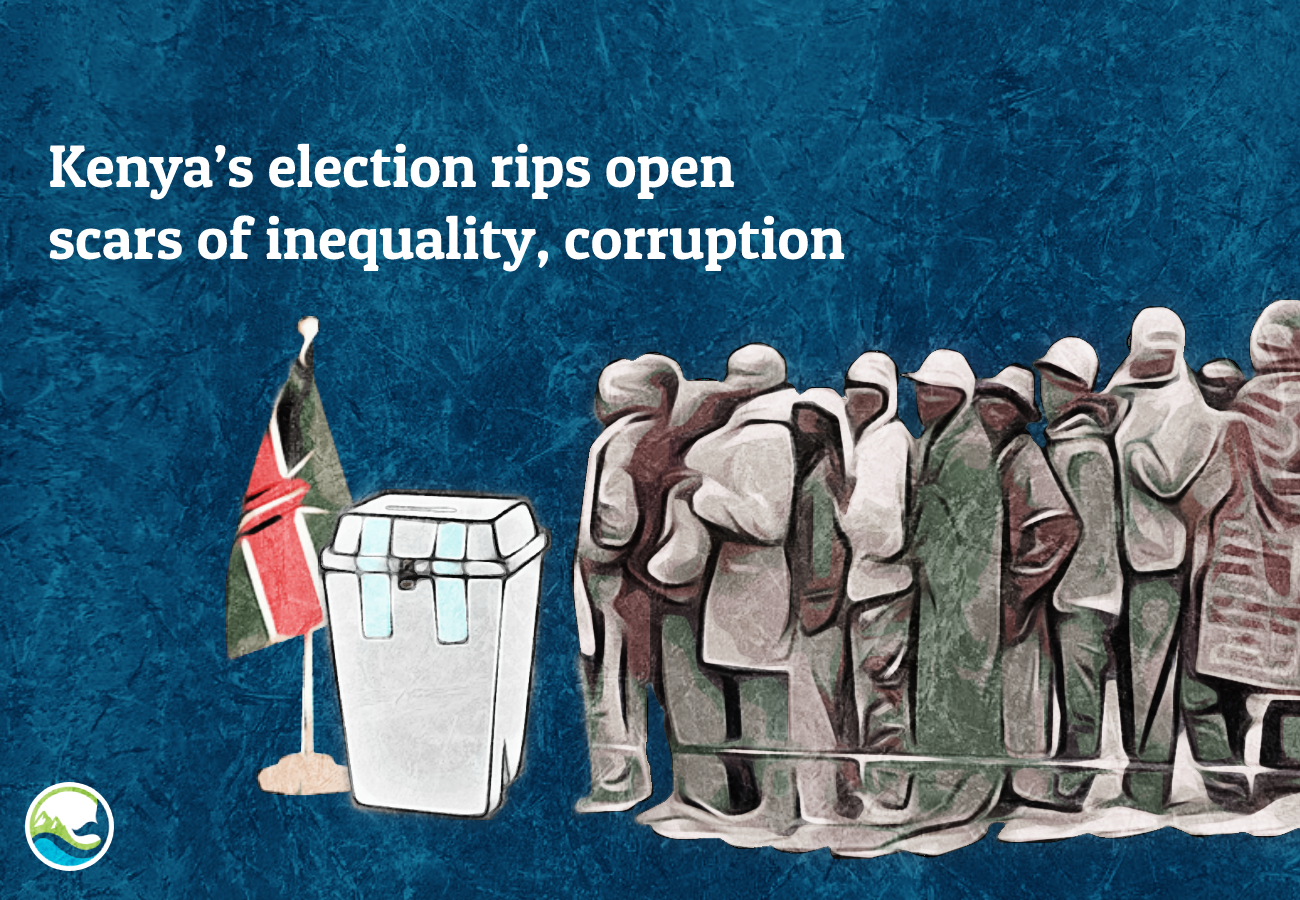
Kenya’s election rips open scars of inequality, corruption
3 Aug 2022 (News Channel 21)
In the shadow of a glossy, thousand-dollar campaign billboard, one of many across Kenya’s capital, street vendors struggle to make even 200 shillings ($1.68) a day and often pocket none.
Kenya’s Aug. 9 election is ripping open the scars of inequality and corruption as East Africa’s economic hub chooses a successor to President Uhuru Kenyatta. The vastly rich son of the country’s founding leader, Kenyatta has deflected graft allegations by calling for transparency but done little in a decade in power to enable it.
The vendors on a barren patch along Nairobi’s Outer Ring Road can hardly grasp the enormous amounts of money spent on next week’s election. Few can. In Kenya, candidates aren’t required to publicly account for campaign donations or spending. But voters have watched the helicopters and long convoys that have whisked top candidates around the country for months.
“They’re spending millions of dollars, but I’m not sure if it’s their own money or the public’s money,” said Martin Wambua, who sells secondhand clothes and rarely is able to save anything from his earnings.
“I know the (election spending) can fund more than 10 people a day,” estimated Joseph Kaguthi, who walks everywhere selling baked goods and says he often eats just one daily meal. “But I’m a poor man, and maybe the way I talk is distant from the way it is.”
Rising prices for food and fuel, exacerbated by Russia’s invasion of Ukraine and following the economic pain of the COVID-19 pandemic, add to the traditional ethnic tensions in a vote called so closely contested that Kenya might go to a runoff election for the first time.
How the country of 56 million people will cope with extended uncertainty is a major question after a recent history of turbulent elections.
The 2017 vote saw results overturned by the courts, a first in Africa. Longtime opposition contender Raila Odinga boycotted the ordered re-vote and declared himself the “people’s president” in a mock swearing-in that led to allegations of treason. The standoff ended when Kenyatta and Odinga, the son of Kenya’s first vice president, shared a public handshake.
Now, in the latest twist of Kenya’s shifting alliances, Kenyatta is backing former rival Odinga to succeed him after falling out with his deputy president, 55-year-old William Ruto, the other main presidential candidate and a former Odinga ally.
Ruto was indicted by the International Criminal Court for crimes against humanity for his role in violence following the 2007 election that killed more than 1,000 people after Odinga alleged he had been cheated out of victory. An ICC indictment is hardly a bar to the presidency; Kenyatta was indicted over the turmoil, too. Both men saw their cases terminated amid allegations of witness tampering.
Said to be one of Kenya’s richest men after a decade as deputy president, Ruto promotes himself to the young and poor as a “hustler” who rose from humble beginnings as a chicken seller in contrast to the elite backgrounds of Kenyatta and Odinga. Ruto says he seeks greater agricultural productivity and financial inclusion. Agriculture is a main driver of Kenya’s economy and about 70% of the rural workforce is in farming, while informal street vendors make up the majority of non-farm work.
“Our economic system is rigged against small people,” Ruto said in a campaign video that came out as his wealthy running mate Rigathi Gachagua was ordered by a court to repay about $1.6 million to the state after the money was ruled to be the proceeds of corruption.
Ruto has said he will accept the election outcome “whichever way it goes.”
The 77-year-old Odinga in his fifth and likely final try at the presidency is campaigning closely with running mate Martha Karua, a former justice minister who could become Kenya’s first female deputy president. She has caught the attention of women in a country that still fails to meet a gender quota for elective bodies like Parliament and where female candidates commonly face harassment.
Odinga, famous for being jailed while fighting for multi-party democracy decades ago, has promised cash handouts to Kenya’s poorest while saying “the middle class, of course, know how to look after themselves.” He has said he’ll accept election results “as long as they’re free and fair.”
When asked how much they were spending on the election, an Odinga spokesman told The Associated Press they will conduct a financial audit to find out at the end of the campaign. A spokesman for Ruto didn’t respond.
Ruto and Odinga say they’ll fight corruption, but non-governmental organizations sigh over Kenya’s failure to address the graft that eats away at everyday lives. The vendors on Nairobi’s Outer Ring Road described having to bribe hospitals for timely treatment and the city’s notorious inspection officers to avoid alleged petty offenses.
Corruption is said to be widespread among those running for office. Interior Minister Fred Matiangi has described Parliament candidates handing out as little as 100 shillings (84 cents) to win votes in villages.
The underfunded Independent and Electoral Boundaries Commission, which sought to cap presidential campaign spending at 4.4 billion shillings ($36 million), has accused some politicians of buying people’s identification cards to keep them from voting for rivals.
“Out of the 214 persons blacklisted by the Ethics and Anti-Corruption Commission as morally and ethically unfit to hold public office, the (electoral commission) barred only six individuals,” Transparency International Kenya and other watchdogs said in June. For the rest, “the commission seems to have thrown their hands in the air.”
Kenyans want a peaceful election with results accepted by all sides.
“If we fight, it will basically backfire more on us than on them,” said Andrew Atonya, part of a production company that staged a play in Nairobi asking voters to avoid falling prey to election divisions. “They abuse each other,” he said of candidates, “but behind the curtain, they’re friends.”



